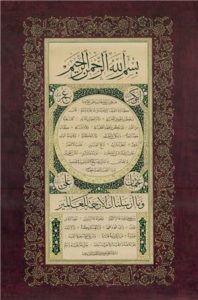 Bismillahi rahmani raheem, assalamu alaikum.
Bismillahi rahmani raheem, assalamu alaikum.
From an early age Imam Tustari led an ascetic life with frequent fasting and study of the Qur’an and Hadith, He practised repentance (tawbah) and, above all, constant remembrance of Allah (dhikr). This eventually culminated in a direct and intimate rapport with Allah with whom He was a special friend and one of the spiritual elect, Awliyah. Imam Tustari was also near to the Islamic Scholars of Hadith, when he met Imam Abu Dawwud he said “O Abu Dawwud, I want something from you.” He said, “What is it?” Sahl said, “On a condition that you say that you will fulfill it if possible.” Abu Dawwud replied in the affirmative. Sahl said, “Get out your tongue with which you narrated the hadiths of the Prophet (peace be upon him) so that I kiss it.” Abu Dawwud accepted that and Sahl kissed his tongue.
The Imam was also an Islamic scholar who commented on and interpreted the Qur’an, Imam Tustari explained that the Qur’an “contained several levels of meaning”, which included the outer or zahir and the inner or batin, in modern terms, Shariah, the study of governing life and Science, the study of how the universe works. Imam Tustari also “was the first to put” the Sufi exercise of remembrance of Allah, Dhikr, “on a firm theoretical basis” an immense place to be given by Allah and likewise was His maqam.
Shaykh Abu Bakr bin Haw’war stated in Bahjat-ul-Asrar that, ‘There are seven Awtad (Pillars/Major Awliya) of Iraq: Shaykh Ma’ruf Karkhi, Shaykh Imam Ahmad bin Hanbal, Shaykh Bishr Hafi, Shaykh Mansur bin ‘Ammar, Shaykh Junayd, Shaykh Sahl bin ‘Abdullah Tustari, Shaykh ‘Abd al-Qadir al-Jilani. The Awtad (Pillars) are those who are the sovereigns of the world, and the Qutbs of the earth (the Spiritual axis around which the soul of the world revolves).’ (Bahjat-ul-Asrar, p. 385)
The Imam famously said “I am the Proof of Allah for the created beings and I am a proof for the saints (awliya) of my time,” any person who reads His tafsir will see His language and tafsir of qualities in the Quran was used the world over after his time, His definitions of things are still used to this day and they are the foundations of/in many languages.
Like Imam abd Al-aziz Al-Dabbagh (as), Imam Tustari (as), was someone I took from spiritually, His statment “I am the Proof” I witnessed it the frist time I opened His tafsir and long before I knew who He (as) was, as soon as you read His (as) words you can see their is something different about His (as) insight like they are “Sirat al Mustaqeem” which we ask for when reciting al fatiha.
On the day of Judgment you will see Imam Tustari in the first few rows of the Ummah, this is something Allah has shown us, Insha Allah if you want His Baraka in your life and home connect yourself to Him (as) by acquiring His (as) tafsir, if you can not you can at my site.
https://ghayb.com/encyclopedic-works/
Shaykh Rami Al Rifai.

